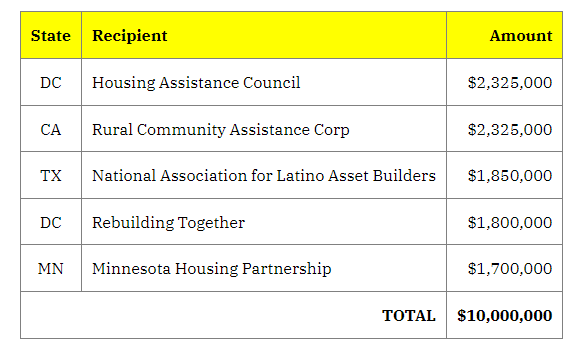The U.S. Department of Housing and Urban Development (HUD) announced the award of $12 million in grants to support non-profit, self-help housing organizations that enable homeownership opportunities for hard-working, low-income families, and individuals. Funded through HUD's Self-Help Homeownership Opportunity Program (SHOP), the grants awarded May 11, along with the labor contributed by homebuyers and numerous volunteers, will significantly lower the cost of homeownership.
Additionally, HUD awarded $10 million in Rural Capacity Building (RCB) grants. The RCB program enhances the capacity and ability of rural housing development organizations, Community Development Corporations (CDCs), Community Housing Development Organizations (CHDOs), rural local governments, and Indian tribes to carry out affordable housing and community development activities in rural areas for the benefit of low- and moderate-income families and persons.
“Today, we are investing in homeownership and expanding access to affordable housing to rural communities,” said HUD Secretary Marcia L. Fudge. “The SHOP program provides a unique pathway for first-time homeowners and underserved groups to buy a home. At HUD, we care about rural America and these capacity building grants are further evidence of our commitment.”
Organizations who receive RCB and SHOP funding partner with local beneficiaries and affiliates to help people and communities throughout the country by increasing access and availability to affordable homes. HUD Deputy Secretary Adrianne Todman announced the awards today in Russellville, Arkansas where she stood alongside a future SHOP homeowner, and a local organization who benefited from Rural Capacity Building grants to help make this happen.
“The Biden-Harris Administration is committed to helping Americans who live in rural communities get access to quality affordable housing, to rent and to own,” said HUD Deputy Secretary Adrianne Todman. “Through these grants, HUD and our partners will build and repair homes, and create housing solutions that match the unique needs of rural neighborhoods.”
HUD's Self-Help Homeownership Opportunity Program (SHOP)
The SHOP program provides federal grants on a competitive basis to national and regional non-profit organizations and consortia that have experience in administering self-help homeownership housing programs. The SHOP grants must be used to purchase land and make necessary infrastructure improvements, which together may not exceed an average SHOP investment of $15,000 per dwelling unit. Leveraged funds must be used for the construction or rehabilitation of these homeownership units. Many of the SHOP homebuyers are first-time homeowners and come from underserved groups.
Since 1996, when Congress first appropriated SHOP funds, the SHOP program has provided more than $396 million in federal grants that, together with significant leveraged funds and numerous volunteer hours, are transforming lives and neighborhoods through the production of over 28,500 units of affordable, homeownership housing.
Homebuyers will contribute significant sweat equity toward the development of their units and/or the units of other homebuyers participating in the local self-help housing programs. These sweat equity contributions reduce the purchase price of the SHOP units and make these units affordable for low-income homebuyers. A minimum of 100 sweat equity hours is required from a household of two or more persons.
A minimum of 50 sweat equity hours is required from a household of one person. Community participation consisting of volunteer labor contributions is also required. Sweat equity and volunteer labor may include, but are not limited to, landscaping, foundation work, painting, carpentry, trim work, drywall, roofing and siding for the housing. Reasonable accommodations must be made for persons with disabilities.
HUD’s Rural Capacity Building (RCB)
The RCB enhances the capacity and ability of local governments, Indian tribes, housing development organizations, rural CDCs, and rural CHDOs, to carry out community development and affordable housing activities that benefit low- and moderate-income families and persons in rural areas.
To read the full release, click here.

 theMReport.com Your trusted source for mortgage banking news
theMReport.com Your trusted source for mortgage banking news










